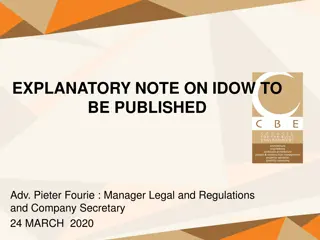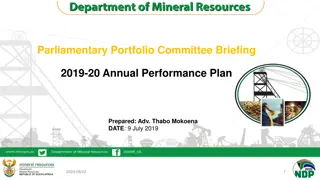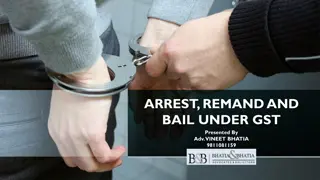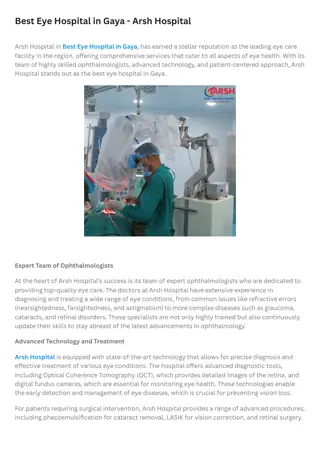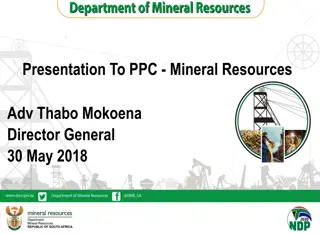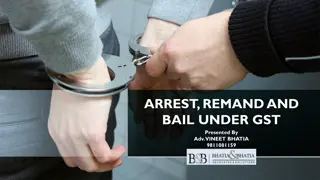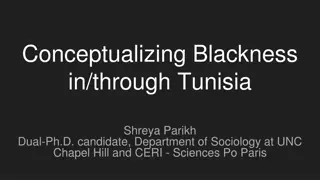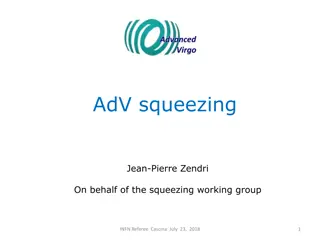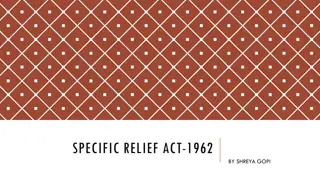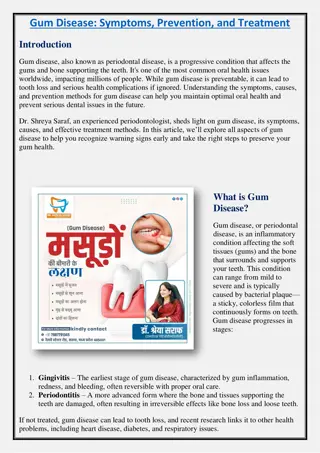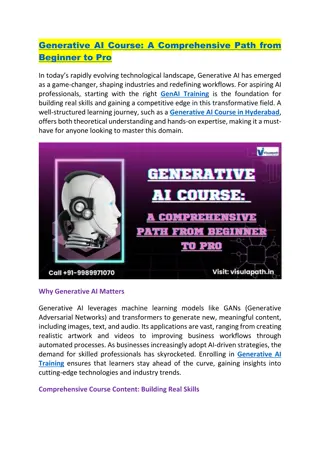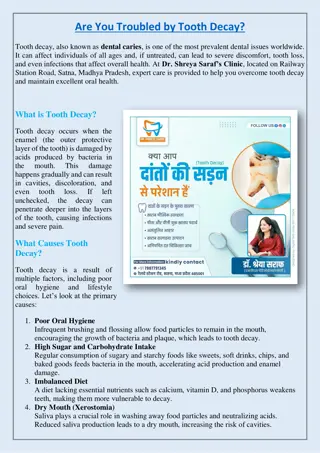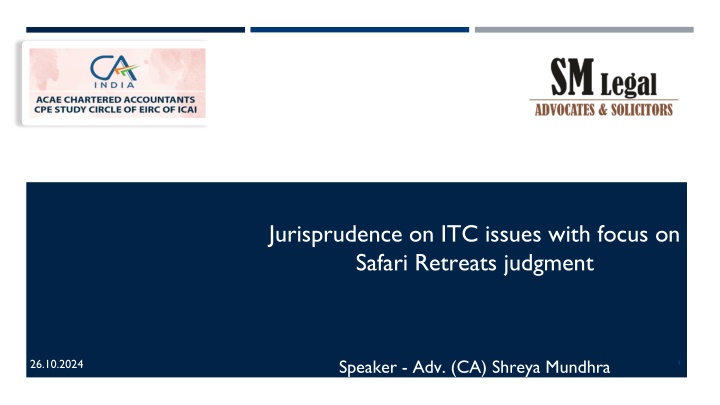
Apex Court Ruling on ITC Issues with Focus on Safari Retreats Judgment
Explore the Hon'ble Apex Court ruling in the Safari Retreats case, where the denial of Input Tax Credit (ITC) for businesses constructing immovable properties for rent was debated, challenging the constitutionality and interpretation of relevant provisions of the GST Act. Witness the arguments presented and the questions posed before the Supreme Court regarding the applicability of definitions, constitutional validity, and more.
Download Presentation

Please find below an Image/Link to download the presentation.
The content on the website is provided AS IS for your information and personal use only. It may not be sold, licensed, or shared on other websites without obtaining consent from the author. If you encounter any issues during the download, it is possible that the publisher has removed the file from their server.
You are allowed to download the files provided on this website for personal or commercial use, subject to the condition that they are used lawfully. All files are the property of their respective owners.
The content on the website is provided AS IS for your information and personal use only. It may not be sold, licensed, or shared on other websites without obtaining consent from the author.
E N D
Presentation Transcript
Jurisprudence on ITC issues with focus on Safari Retreats judgment Speaker - Adv. (CA) Shreya Mundhra 26.10.2024 1
HONBLE APEX COURT RULING IN THE CASE OF SAFARI RETREATS Proceedings before the Hon ble Orissa High Court: The assessee, engaged in construction of shopping mall for the purpose of letting out premises in the malls to different tenants, had procured goods & services for construction of the malls. Huge ITC was accumulated as the said credit was restricted as per Section 17(5)(d) of the GST Act even when letting out of units in the shopping mall was leviable to outward GST based on the rent received. Writ was filed before the HC seeking a ruling that Section 17(5)(d) of the GST Act does not apply to the construction of immovable property intended for letting out as is violative of Articles 14 and 19(1)(g) of the Constitution. Hon ble HC read down Section 17(5)(d) and held that if the assessee is required to pay GST on the rental income from the mall, ITC on the GST paid on the construction of the mall was eligible thereto. The department had filed an SLP against the aforesaid judgement. Strictly confidential 2
HONBLE APEX COURT RULING IN THE CASE OF SAFARI RETREATS Arguments before the Hon ble Supreme Court: The Respondent argued that denying ITC to businesses constructing immovable property for rent was arbitrary and violated constitutional equality, as both rental and sale immovable properties generate taxable activities. They advocated for a broader interpretation of plant or machinery and ownaccount to include buildings integral to business operations. Conversely, the Revenue Department contended that the phrasing of or in plant or machinery was a drafting error, and allowing ITC for property construction could lead to revenue loss and inconsistencies. They emphasized that ITC is a statutory privilege, not a fundamental right, and its scope can be defined by the legislature. Strictly confidential 3
HONBLE APEX COURT RULING IN THE CASE OF SAFARI RETREATS Questions before the Hon ble Supreme Court: Whether the definition of plant and machinery in the explanation appended to Section 17 of the CGST Act applies to the expression plant or machinery used in Section 17(5)(d)? If it is held that the explanation does not apply to plant or machinery , what is the meaning of the word plant ? Whether clauses (c) and (d) of Section 17(5) and Section 16(4) of the CGST Act are unconstitutional? Strictly confidential 4
HONBLE APEX COURT RULING IN THE CASE OF SAFARI RETREATS Legal provisions before the Hon ble Supreme Court: Section 17(5)(c) ITC is not available in respect of works contract service received for construction of immovable property Except where the immovable property is plant and machinery Except where the works contract is an input service for further supply of works contract service Section 17(5)(d): ITC is not available in respect of goods or services or both received for construction of immovable property, received for construction of immovable property on own account, even when used in course or furtherance of business Except where immovable property is plant or machinery Definition of Plant and machinery: Explanation to Section 17(5) provides that expression plant and machinery means apparatus, equipment, and machinery fixed to earth by foundation or structural support that are used for making outward supply of goods or services or both and includes such foundation and structural supports but excludes- (i) land, building or any other civil structures; (ii) telecommunication towers; and (iii) pipelines laid outside the factory premises. Strictly confidential 5
HONBLE APEX COURT RULING IN THE CASE OF SAFARI RETREATS Relevant extract of the judgment [Para 32]: Clause (d) of Section 17(5) is different from clause (c) in various aspects. Clause (d) seeks to exclude from the purview of sub-section (1) of Sections 16 and 18, goods or services or both received by a taxable person to construct an immovable property on his own account. There are two exceptions in clause (d) to the exclusion from ITC provided in the first part of Clause (d). The first exception is where goods or services or both are received by a taxable person to construct an immovable property consisting of a "plant or machinery". The second exception is where goods and services or both are received by a taxable person for the construction of an immovable property made not on his own account. Construction is said to be on a taxable person's "own account" when (i) it is made for his personal use and not for service or (ii) it is to be used by the person constructing as a setting in which business is carried out. However, construction cannot said to be on a taxable person's "own account" if it is intended to be sold or given on lease or license . Strictly confidential 6
HONBLE APEX COURT RULING IN THE CASE OF SAFARI RETREATS Findings of the Hon ble Apex Court: Validity of Section 16(4), 17(5)(c) & (d) were upheld. The Supreme Court s decision can be bifurcated into two parts 1. Ratio of the decision on the primary issue related to meaning of the expression plant or machinery in Section 17(5)(d); and 2. Key observations with respect to the scope of the words on its own account Strictly confidential 7
HONBLE APEX COURT RULING IN THE CASE OF SAFARI RETREATS Meaning of plant or machinery : The expression plant or machinery cannot be construed in the manner as the expression plant and machinery has been defined under the Explanation to Section 17(5). With respect to the scope of the term plant , the Supreme Court relying on its previous decisions [Ref: Anand Theatres] in the Income Tax law, held that the hotels and cinema theatres cannot be said to be a plant in their entirety. However, the applicability of these decisions [Ref: Karnataka Hydro Power Corporation] has been held to be limited to the extent of hotels, cinema theatres and not on other immovable properties. Accordingly, for other cases involving malls, warehouses, etc., the Supreme Court has propounded application of functionality test to ascertain 1. Whether the immovable property has been constructed to suit assessee s special technical needs; and 2. Whether immovable property is essential to carry out the business activities of the assessee. Strictly confidential 8
HONBLE APEX COURT RULING IN THE CASE OF SAFARI RETREATS Meaning of on its own account : The Supreme Court observed that the expression on its own account entails the following: 1. Where the immovable property will be used for personal purposes and not for providing any services; or 2. Where the immovable property will be used as a setting for carrying out its business activities. It further observed that in case where the immovable property is constructed for the purpose of sale or lease/ licence, then the same cannot be said to be constructed on its own account . Strictly confidential 9
HONBLE APEX COURT RULING IN THE CASE OF SAFARI RETREATS Relevant extracts: Para 52 - This Court held that whether a building is a plant is a question of fact. This Court held that if it is found on facts that a building has been so planned and constructed as to serve an assessee's special technical requirements, it will qualify to be treated as a plant for the purposes of investment allowance. Para 55 - Under the CGST Act, as observed earlier, renting or leasing immovable property is deemed to be a supply of service, and it can be taxed as output supply. Therefore, if the building in which the premises are situated qualifies for the definition of plant, ITC can be allowed on goods and services used in setting up the immovable property, which is a plant. Strictly confidential 10
HONBLE APEX COURT RULING IN THE CASE OF SAFARI RETREATS Functionality test as made applicable under the Income Tax Act, 1961: Under Income tax laws, plant is eligible for higher depreciation as compared to a building. For this purpose, functionality test has been applied under the Income tax laws from time to time to determine whether a building qualifies as a plant or not. Principle - If a building or structure or part thereof is such by which the business activities are carried on then it would amount to plant. But where the structure plays no part in carrying on the business activities and is used as the place for carrying on the business, it will fall within the category of a building, and it cannot be called as plant. Where part of the construction of the building is specially designed and meant for carrying on the mechanical process, it will be a plant and where part of it is used for various activities like research, office or the like, such construction could not be treated as a plant. Strictly confidential 11
HONBLE APEX COURT RULING IN THE CASE OF SAFARI RETREATS Rulings under the Income Tax Act, 1961 relating to functionality test: Karnataka Power Corporation 2002 (9) SCC 571 : Hydro power generating station building is a plant. CIT v. Venkata Rao (Dr B) - [(2000) 243 ITR 81 (SC)] - Nursing home was a plant because operation theatre, sterilisation rooms, etc. were a substantial part of the building, specifically designed for a nursing home. Cachet Pharmaceuticals Private Limited v. Commissioner of Income Tax and another factory building used solely for medicine manufacturing qualified as a plant because it was integral to the business s operation. [2016 (4) TMI 713], held that a Strictly confidential 12
HONBLE APEX COURT RULING IN THE CASE OF SAFARI RETREATS Way forward: Factual exercise is to be conducted on case-by-case basis to ascertain that whether a particular immovable property qualifies as a plant or not. It requires a detailed analysis of the building's specific features, purpose, and role in the business. This approach avoids broad generalizations and ensures that each case is assessed on its own merits. Once the assessees pass the functionality test, they will be eligible to claim ITC for past periods, subject to the limitation specified in Section 16(4). Exploring possibility of restructuring future inward supplies to maximize availability of ITC. Industries effected: Manufacturing, Hospitality, Mall & Retail, Warehousing, Commercial Leasing, Co-working spaces, REITs, Theatres & Convention Centres, Data centres, IT & ITES, Banking etc. Strictly confidential 13
HONBLE APEX COURT RULING IN THE CASE OF SAFARI RETREATS Issues: Whether functionality test is required in instances where the immovable property has been constructed for the purpose of renting, leasing etc. [Example - Office building given on lease] Whether the conditions of functionality test and construction on its own account are mutually exclusive or not. Clarity on the meaning of the term Special technical requirement specified to qualify as a plant? [Example - Malls having specific layouts for accessibility and visibility etc., Captive Power Plants, Data Centres, R & D Labs, Convention centres, cold storage units, dry dock etc.] Can the phrase goods or services or both under Section 17(5)(d) be said to include works contract services? Strictly confidential 14
ISSUES UNDER SECTION 16(2) OF THE CGST ACT Denial of ITC in the hands of bonafide purchaser: A. Mismatch with Form GSTR-2A B. Tax not paid by supplier C. Burden of proving compliance & proper documentation rests on the purchaser - Section 155 of the CGST Act Relevant Judgments: Suncraft Energy Private Limited V. The Assistant Commissioner 2023-VIL-487-CAL (SLP dismissed by SC) D.Y. Beathel Enterprises v. State Tax Officer (2021) 127 Taxman. Com 80 (Madras) M/s. Anil Rice Mill v. State of U.P. & 2 Others [2024 (8) TMI 904 - All HC] Strictly confidential 15
ISSUES UNDER SECTION 16(4) OF THE CGST ACT Timeline to claim ITC in case of RCM supplies, not paid for past period: The relevant financial year for calculation of time limit for availment of ITC will be the financial year in which the invoice has been issued by the recipient under section 31(3)(f) of CGST Act. Delay in issuance of invoice by recipient may invite interest and penal provisions, as applicable. [Circular No. 211/5/2024-GST dated 26/06/2024] Validity under challenge - Pending before Supreme Court Strictly confidential 16
APPLICABILITY OF LIMITATION ACT ON GST PROVISIONS Contrary judgments on applicability of Limitation Act under GST Law : Rejected application of Limitation Act: M/s. Abhishek Trading Corporation v. Commissioner (Appeals) & Another [2024 (2) TMI 1214 - All HC] M/s. Yadav Scrap Traders v. Additional Commissioner & Another [2024 (2) TMI 1359 - All HC] Vishal Kumar Gupta, (Proprietor of M/S Arya Enterprises) v. Union of India [2024 (7) TMI 610 - PATNA HC] Penuel Nexus Pvt. Ltd. v. Additional Commissioner Headquarters [2023 (6) TMI 941 - KERALA HC] Upheld application of Limitation Act: Kajal Dutta v. Assistant Commissioner of State Tax, Suri Charge & Ors. [Order dated January 20, 2023] S.K. Chakraborty & Sons Versus Union Of India & Ors. [2023 (12) TMI 290 CALCUTTA HC] Strictly confidential 17
ISSUES RELATING TO E-WAY BILL Penalty imposed on Expiry of E-way Bill - Identification of Mens Rea : M/s. Prahlad Rai Vijay Kr. v. State of UP [2024 (5) TMI 920 - All HC] Faruk Rathore Prop. of M/s. Hindustan Trading Company v. Dy. Commissioner, Central Goods & Service Tax, Bikaner [2024 (5) TMI 1122 Raj. HC] M/s. Satyam Shivam Papers Pvt. Ltd. v. Asst. Commissioner ST & 4 Others [2021 (6) TMI 378 - TELANGANA HC] Penalty imposed on account of Typographical error - Intention to evade tax present or not M/s. Hindustan Herbal Cosmetics v. State Of U.P. & 2 Others [2024 (1) TMI 282 - All HC] Strictly confidential 18
OTHER ISSUES IGST on Ocean freight in case of FOB Contracts is invalid - Applicability of Mohit Minerals SC Judgment in case of CIF Contracts M/S Agarwal Coal Corporation Pvt. Ltd. v. The Assistant Commissioner of State Tax [2024 (3) TMI 1265 - BOMBAY HC] BLA Coke Pvt. Ltd. v. Union Of India & Ors. [2024 (10) TMI 492 - GUJARAT HC] Review vs. Rectification Sajal Kumar Das v. State Of West Bengal & Ors. [2024 (1) TMI 1011 - CALCUTTA HC] Strictly confidential 19
THANK YOU ANY QUESTIONS? 20 20
DISCLAIMER This document is merely intended for informational purposes. This document should not be construed as a legal opinion. No person should rely on the contents of this document without first obtaining advice from a qualified professional person. This document is contributed on the understanding that the Firm, its employees and consultants are not responsible for the results of any actions taken on the basis of information in this document, or for any error in or omission from this document. Further, the Firm, its employees and consultants, expressly disclaim all and any liability and responsibility to any person who reads this document in respect of anything, and of the consequences of anything, done or omitted to be done by such person in reliance, whether wholly or partially, upon the whole or any part of the content of this document. Without limiting the generality of the above, no author, consultant or the Firm shall have any responsibility for any act or omission of any other author, consultant or the Firm. This update does not and is not intended to constitute solicitation, invitation, advertisement or inducement of any sort whatsoever from us or any of our members to solicit any work, in any manner, whether directly or indirectly. You can send us your comments at: smlegaladvocates@gmail.com 21






